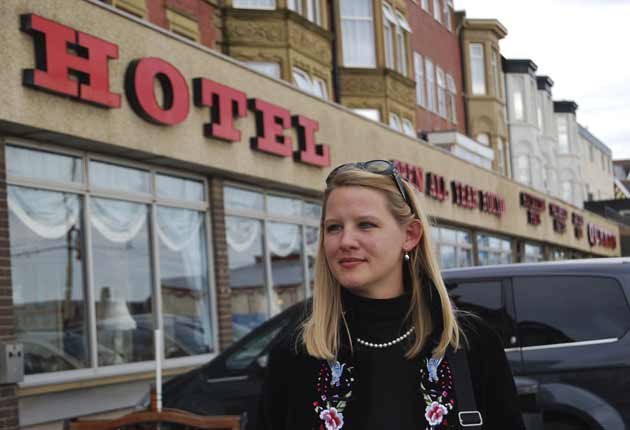Can You Bank On Me? BBC1<br/>Rich Man, Poor Man: A Knight's Tale, BBC4
Former City workers exercise their skills in this strange mixture of 'Wife Swap' and 'The Apprentice'

Your support helps us to tell the story
From reproductive rights to climate change to Big Tech, The Independent is on the ground when the story is developing. Whether it's investigating the financials of Elon Musk's pro-Trump PAC or producing our latest documentary, 'The A Word', which shines a light on the American women fighting for reproductive rights, we know how important it is to parse out the facts from the messaging.
At such a critical moment in US history, we need reporters on the ground. Your donation allows us to keep sending journalists to speak to both sides of the story.
The Independent is trusted by Americans across the entire political spectrum. And unlike many other quality news outlets, we choose not to lock Americans out of our reporting and analysis with paywalls. We believe quality journalism should be available to everyone, paid for by those who can afford it.
Your support makes all the difference.Had the public selected a punishment for the City boys and girls who many hold responsible for the present recession, they would surely have dreamt up something more unpleasant than milking cows.
But the documentary Can You Bank on Me?, which challenged two former financiers to get their hands dirty at crunch-stricken businesses and engineer survival strategies, wasn't ultimately about retribution and redemption.
Arch-Sloane Griselda, a former hedge fund manager, was tasked with reversing the fortunes of Blackpool institution Queens Hotel. Meanwhile, Amit, a cocky ex-investment analyst, was off to a struggling dairy farm. Set up thus, I was looking forward to a slice of Schadenfreude as they made a hash of things in the world beyond the Square Mile.
What followed was a curious zygote of Wife Swap and The Apprentice. The bankers actually managed rather well. Griselda fixed a smile and scrubbed toilets; Amit mastered cheesecake-making, and both produced plausible business plans.
Thankfully it wasn't a neat sinner-to-saint trajectory. Struggling with their new colleagues' questions, there was no avoiding the absurdity of the wealth gap. Griselda, who once raked in £70,000 a year, had her diplomacy skills tested when Lisa, a waitress on £600 a month, asked if she thought finance was harder than waiting tables.
Later, it was Griselda's turn, berating Lisa's reliance on credit cards. "You have to take responsibility," she barked. There was a grain of truth there, albeit couched in hypocrisy. But it summed up what the programme demonstrated well – how two lives can seem so distinct and yet be utterly intertwined.
Money was also the focus of Rich Man, Poor Man: A Knight's Tale, for which Ian Denyer spent three years filming self-made millionaire and philanthropist Sir John Madejski. The first in a series about "wealthy people seeking a deeper understanding of themselves", it was a frustrating watch.
Madejski grew up not knowing who his biological father was, casting a shadow over much of his life. In the past three years he has successfully identified him through DNA, but that was about all we were told.
Ignoring this not uncommon but compelling human story, Denyer seemed obsessed by the trappings of Madejski's success. But even the gawping potential was thin – his best celeb friend is Cilla Black, not Angelina Jolie.
The cliché-sodden commentary desperately tried to link Madejski's money and his unhappiness, but Madejski's uncertain parentage would have been a source of angst had he been poor. Money hadn't erased it, but nor had it caused it.
Denyer concluded that losing some of his money in the recession might be "the best thing that happened to John Madejski". I doubt his subject would agree, but if it did come to that, perhaps the director could remake this film with less Cilla and swimming pools, and more emotional curiosity.
Join our commenting forum
Join thought-provoking conversations, follow other Independent readers and see their replies
Comments